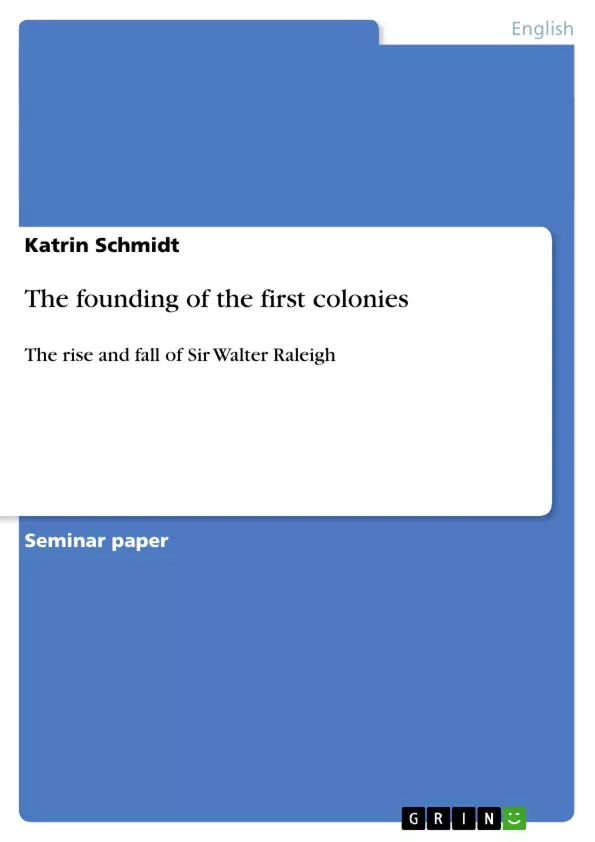Brief Introduction into Elizabethan England: the importance of nation, society and religion
The reign of Queen Elizabeth I is probably the most powerful period within Tudor times. During her reign, the English nation arose to a worldwide renowned empire due to the defeat of the Spanish Armada, the first English circumnavigation of the globe by Sir Francis Drake, the chartering of the first companies for overseas trade in India and the founding of the first colony, Virginia, by Sir Walter Raleigh. During that period of time, all this has been documented in maps, letters and literature, e.g. poems and early travel novels that give us an impression of the English nation formation and the first attempts of colonisation at that time, although it might include fiction. One central figure who had not only the dream of exporting
the English nation to America and of promoting its greatness worldwide, but was also a soldier, a sailor, a Member of Parliament, a courtier, a contemporary writer and a poet, was Sir Walter Raleigh.
Inhaltsverzeichnis (Table of Contents)
- BRIEF INTRODUCTION INTO ELIZABETHAN ENGLAND: IMPORTANCE OF NATION, SOCIETY AND RELIGION.
- RALEIGH'S LIFE IN THE HANDS OF ROYAL ARBITRARINESS
- Raleigh's exceptional relationship with Queen Elizabeth I
- Raleigh as a writer during King James's reign
- EXPORTING THE ENGLISH NATION
- Virginia – the first English colony dedicated to the Queen
- Defeat of the 'Invincible' Spanish Armada.
- Raleigh's American Dream: Longing for El Dorado and Guiana
- CONCLUSION
Zielsetzung und Themenschwerpunkte (Objectives and Key Themes)
This work aims to explore the life of Sir Walter Raleigh and his role in the founding of the first English colonies. The text analyzes Raleigh's relationship with Queen Elizabeth I, his rise and fall from power, and his contributions to the expansion of the English nation.
- The importance of nation, society, and religion in Elizabethan England
- Sir Walter Raleigh's exceptional relationship with Queen Elizabeth I
- The rise and fall of Sir Walter Raleigh
- The founding of the first English colonies
- Sir Walter Raleigh's literary contributions
Zusammenfassung der Kapitel (Chapter Summaries)
- Brief Introduction into Elizabethan England: The Importance of Nation, Society, and Religion: This chapter provides an overview of the social, political, and religious context of Elizabethan England, highlighting the rise of the English nation during Queen Elizabeth I's reign.
- Raleigh's Life in the Hands of Royal Arbitrariness: This chapter focuses on Raleigh's relationship with Queen Elizabeth I and his rise to prominence at court. It examines his exceptional relationship with the Queen, his literary output, and the challenges he faced during her reign.
- Exporting the English Nation: Founding the First Colonies: This chapter delves into Raleigh's involvement in colonizing expeditions to America. It explores the founding of Virginia, the first English colony dedicated to the Queen, and Raleigh's dream of finding El Dorado and Guiana.
Schlüsselwörter (Keywords)
The work focuses on key themes such as Elizabethan England, colonialism, exploration, Sir Walter Raleigh, Queen Elizabeth I, nation building, and the role of literature in shaping national identity.
Frequently Asked Questions
Who was Sir Walter Raleigh?
Sir Walter Raleigh was a prominent figure in Elizabethan England, serving as a soldier, sailor, courtier, poet, and Member of Parliament. He is best known for his attempts to colonize North America.
What was the first English colony in America?
The first colony was Virginia, founded by Sir Walter Raleigh and named in honor of the "Virgin Queen," Elizabeth I.
What was Raleigh's "American Dream"?
Raleigh dreamed of exporting the English nation to the Americas and promoted the greatness of England worldwide. He was particularly obsessed with finding the legendary city of gold, El Dorado, in Guiana.
How did Raleigh's relationship with the Queen change?
Raleigh had an exceptional relationship with Elizabeth I, but his fortunes shifted dramatically under King James I, during whose reign he spent many years in prison and was eventually executed.
What role did literature play in English colonization?
Maps, letters, poems, and travel novels of the time documented and often fictionalized the attempts at colonization, helping to shape the English national identity as a rising global empire.
- Quote paper
- Katrin Schmidt (Author), 2008, The founding of the first colonies, Munich, GRIN Verlag, https://www.grin.com/document/93714



